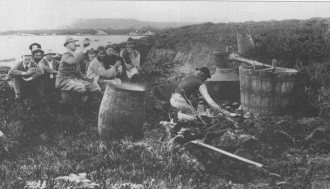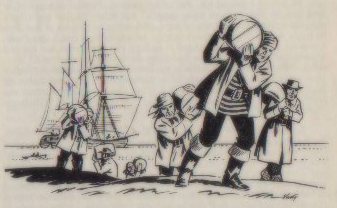
Cahore, Co.Wexford

Cahore, Co.Wexford
LYDIA
The 433 ton 'LYDIA' stranded on the Blackwater Bank on 26-11-1860 Cahore lifeboat tried to put out but the vessel ran towards the beach and the 18 crew were rescued by the coastguards. (1) ROYAL HUMANE SOCIETY BRONZE MEDAL
R.PAOLOSKY Commissioned Boatman Coastguard 9th November 1888 Cahore, Wexford
T.CROCKETT Commissioned Boatman Coastguard 9th November 1888 Cahore, Wexford
- Many New Station Photos
- The Woodley Medal Presentation
- The Tayleur Fund Medal
- Irish Coastguard Service : Stages of Development
- Dated Ships, Dated Tactics
Latest Posts on the Forum;
- Charles Bagehot
- 19th Cent. CG Sword
- Crimea war & Coastguard
- Mark Martin
- Superannuated Coastguards
CoY Forum
I would be glad to receive any coastguard information, stories or general snippets and pass it on in to our readers.
| Link Removed | | Link Removed | | Link Removed | | Link Removed | | Link Removed |

SUPERSTITION. The people on the island were very superstitious. These superstitions have pagan origins and are still believed by older members of the island. Here are some of the superstitions. When a fisherman was going fishing and he met a red-haired woman, he would bless himself, and would not go fishing as this was a bad sign of things to come. Another one was that, if a boat or ship had sunk and the crew were drowning, another boat passing and seeing them had to leave them to drown. If they saved them they thought they would be next to die. (3)
Wit and Wisdom of Ireland.
Remember
No Rain
No Rainbow |
| Link Removed | | Link Removed | | Link Removed | | Link Removed | | Link Removed | | Link Removed | | Link Removed |
|
The Irish Coast Guard
The Morning Chronicle says "It is understood that the Coast Guard of Ireland - a body who can be made available as fighting men as required - shall shortly be placed under a variety of new regulations. All the highly paid and useless offices will be abolished as they become vacant, while the situations of the working officers and men will be rendered more permanent and advantageous. (6)
February 1853.
The 170 ton 'Tolagazone' carrying Indian Corn for Robert Cutbertson of Sligo, wreced on the Bomore Rocks off Inishmuray. The Captain and crew were saved by the Mullaghmore Coastguard (7) | If you received this newsletter by mistake, please click here. | 
|
|
Dear Friend,
Welcome to the November edition of "The Coastguard Cutter". It's a Hard Life. Life on the islands off the West shore of Ireland can only be described as harsh. On the Aran Islands, as like some of the others hereabouts, there are no trees, only low growing shrubs like the spindle tree, hawthorn and hazel. The Islanders have painstakingly created fields by piling layers of sand and seaweed on top of crushed rock. Seaweed, known as the black weed, was used as fertiliser. Scraping a meagre livelihood from farming and fishing to put food on the table left no time to look on Coastguards and Police with friendly eyes so they dodged the Law whenever they could. Illicit Poitín (aka Poteen) making became a cottage industry. Enjoy,
Tony.
| 
Group seated around a Poitín Still. The illicit production of the "Eau de Vie" of the country was still widespread at the time.
| INISHMURRAY Island, Co. Donegal.
Inishmurray was infamous for Poitín making. There being no natural embarkation point for access to the Island, and no easy landings, visits by the Authorities were few. This enabled the undisturbed islanders to to distil the best illicit whiskey in the County, marketed as "Old Inismurray". When the Revenue Officers did come they had to hire boats locally and word would escape. Then, in the absence of any truly sheltered landing spot, it seems it was always necessary for the local boatman to circle the Island, looking for the easiest landing place. The illicit brew was normally well hidden by the time anyone got ashore.
| Poitín Making.
Poitín making on the Island of Inishtrahull, Co. Donegal.
As told by the Light-house keeper.
"I remember on one occasion when a Poitín distiller was carrying on his business in a vacant house, one of those houses, which belonged to the Islanders who spend their winters on the mainland. The weather had settled down, and quite unexpectedly the Coastguard boat was nearing the Island when she was observed. There was no time to remove anything and to shut up the house was the only alternative., and to depend on chance. Shutters and doors were closed and all outside traces cleared away. Coastguards and Police arrived and they were all over the Island in a few minutes. The Chief Distiller and his assistant (who belonged to the mainland) went into hiding places under the sea-rocks. I was watching the proceedings from the Light-house through my telescope. I saw the Police and Coastguards near the house which had the illicit articles in it. They came back to it several times, after searching the Island, over and over; they had some suspicions that there was something inside they would like to get, but not so much as to justify them by opening the door by force. They got nothing that day except a worn-out "worm" (part of a still) that the Officers in charge of the Coastguards found in a certain place, which an Islanders wife was commissioned to tell him, privately, where to find it. This was discovered and was regarded as a seizure, and they were satisfied." (2) |
GALWAY EXPRESS. 29th.January 1869
"On Sunday night at about 9 0'clock an extensive seizure of illicit whiskey took place at the Claddagh. It appears that James Jagoe , one of the Coastguards, had some intimation that some whiskey would be landed there at night. In due time a boat appeared and soon after a covered car, into which the whiskey was conveyed, and the car then went on to the Grattan Road. Constable Bruce and party pursued, and the car driver, fearing a seizure, disposed of three kegs, containing six gallons each, by throwing them off the car on to the sea beach.
Owing to some unaccountable cause, which we do not know, the driver, horse, and car escaped, and nothing has been seized but merely the kegs containing the poteen".
Smuggling
 Smuggling goods means trading goods without informing the authorities and has generally developed as a result of high taxes imposed by governments. Consequently smuggling is as old as taxation on products and indeed 'started' when King Edward 1 taxed wool exports in 1275. The 18th.Century is regarded as the great smuggler's age. Smuggling goods means trading goods without informing the authorities and has generally developed as a result of high taxes imposed by governments. Consequently smuggling is as old as taxation on products and indeed 'started' when King Edward 1 taxed wool exports in 1275. The 18th.Century is regarded as the great smuggler's age.
Imported examples of taxed imports in those days were tea and liquor and taxes on exports included wool and salted fish. Smuggling was in many cases a sort of organised crime. There was an underground network of storing-places and distribution; excellent hiding places were caves on off-shore islands. Almost everyone-landlord, tenant, middleman, Catholic or Protestant, was involved in it, but the coastguard knew nothing.
The end of the smuggling era came in the 1840's and the main reason for the decline in smuggling was not draconic legislation, but Britain's free trade policy, which decreased import duties. (4)
The life of a Water Guard The life of a Water Guard is very dangerous and full of exciting adventures. One day it was uncovered that a great deal of smuggled goods would be landed that night on the coast during father's watch, about 3 o'clock in the morning. He came to the line which divides his beat from the next station. He did not meet the guard and as his duty compelled him to continue until he did meet the patrol, in the next station, he had no choice but to advance. About three or four miles from the line, he met several wagons loaded with goods. He followed them to the cave, where they were to hide them. He summoned them to surrender, and as they seemed about to resist, he ordered his men to fire in the air. The one who seemed to be the leader cried out, "It is Tom Hart, run!"
All obeyed orders except the teamsters, and they would not abandon their teams. He only took five prisoners. The cave was full of all kinds of costly wines, tobacco and silk. Everything was brought to the castle and stored away until sold by the government, and [as] father had taken them in another station he received double portion of the prize money as a reward from the government.
When mother heard the firing, she was so badly frightened for fear father was killed, she was taken with a nervous chill, and hovered between life and death for a long time. She finally recovered and when father was ordered to the County Kent, in England, she persuaded him to sell his commission and go to my grandfather's in the County Wexford.
Prize Money Prize money was a prominent feature of enforcement of Excise Laws during the 19th Century. Excisemen earned hardly more than subsistence, and were often in conspiracy with the smugglers. Only substantial awards of prize money could deter them from joining in the illegal traffic. The account given shows Tom Hart had information from some source about the smuggling. Hart discovered the smuggling venture rather by mischance, and that the patrol next to his beat "happened" to be absent on the early morning the crime transpired. The possibility that the officer on the next beat had been bribed cannot be excluded. Hart appears to have obtained a prize of about five thousand pounds sterling (currently worth about 150,000). (5) |

 Posted by Tony
on June 17 2007
Posted by Tony
on June 17 2007

 Posted by Tony
on June 17 2007
Posted by Tony
on June 17 2007